Senate returns for cloture vote to extend jobless benefits
Mike Emanuel reports from Capitol Hill
A controversial jobless benefits bill narrowly cleared a key Senate hurdle on Tuesday, over the objections of Republicans who complain the $6 billion measure is not paid for and accuse Democrats of playing politics.
Senators voted 60-37 to advance the bill extending long-term jobless benefits, which expired Dec. 28. Democrats needed 60 votes to move the bill forward.
"Today, I think we have given a bit of hope to millions of Americans, who are struggling in a difficult economy to find jobs, who are struggling to provide sustenance to their families," Sen. Jack Reed, D-R.I., said after the vote.
But Republicans blasted Democratic leaders for pushing the bill without any plan to offset the cost elsewhere in the budget.
"This is all borrowed -- every penny of it," Sen. Jeff Sessions, R-Ala., told Fox News.
Backers of the extension still need to clear several additional votes in the Senate, before the GOP-controlled House can even consider it. House Democratic Whip Steny Hoyer, of Maryland, voiced hope that the Senate could pressure the House to act on the bill.
President Obama applied additional pressure during remarks at the White House on Tuesday, claiming it would boost the economy and help those who need it. "There are still a lot of people who are struggling," Obama said.
Six Republicans voted with Democrats on Tuesday to advance the three-month bill. But the rest of the GOP caucus voiced concern about the cost of the extension, and several claimed Democrats were more interested in political posturing than anything else.
"It is transparent that this is a political exercise, not a real effort to try to fix the problem," Sen. John Cornyn, R-Texas, said.
House Speaker John Boehner made clear that, if the Senate does approve the bill, it would need significant changes to be considered in the House. "One month ago I personally told the White House that another extension of temporary emergency unemployment benefits should not only be paid for, but include something to help put people back to work," he said in a statement. "To date, the president has offered no such plan. If he does, I'll be happy to discuss it, but right now the House is going to remain focused on growing the economy and giving America's unemployed the independence that only comes from finding a good job."
The rhetoric on Capitol Hill cranked up quickly as lawmakers returned from the holiday break.
Senate Majority Leader Harry Reid claimed the middle class is "under siege."
Gene Sperling, director of the National Economic Council, declared at the White House press briefing that Congress should pass the short-term bill with "no strings attached."
It was unclear ahead of the vote how many Republicans would be on board. One, Sen. Dean Heller, R-Nev., is the lone GOP co-sponsor of the legislation. Reid attracted support from five others.
But many Republicans groused about the tone Democrats were taking.
Sen. Tom Coburn, R-Okla., blasted Democrats for suggesting his party doesn't "care about people."
"I think we've abandoned truth in Washington," he told Fox News. "When we move to the area where people can't trust our words because our words are always based on spin and not on facts ... what you're seeing is the unwinding of our institutions."
As drafted, the bill would restore between 14 weeks and 47 weeks of benefits averaging $256 weekly to an estimated 1.3 million long-term jobless who were affected when the program expired Dec. 28. Without action by Congress, thousands more each week would feel the impact as their state-funded benefits expire, generally after 26 weeks.
Republicans appeared split into three camps: Heller and an unknown number of others; a group that is willing to renew the benefits, but insists that the $6.4 billion cost be paid for; and a third group opposed under any circumstances.
Two influential outside organizations opposed the bill, including Heritage Action, which called the program of extended unemployment benefits "ineffective and wasteful."
At issue was a complicated system that provides as much as 47 weeks of federally-funded benefits, which begin after state benefits, usually 26 weeks in duration, are exhausted.
The first tier of additional benefits is 14 weeks and generally available to all who have used up their state benefits.
An additional 14 weeks is available to the unemployed in states where unemployment is 6 percent or higher. Nine more weeks of benefits are available in states with joblessness of 7 percent or higher. In states where unemployment is 9 percent or higher, another 10 weeks of benefits are available.
The Associated Press contributed to this report.





